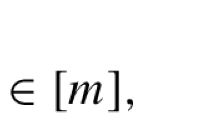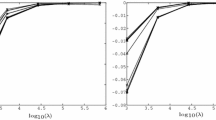Abstract
Various conic relaxations of quadratic optimization problems in nonnegative variables for combinatorial optimization problems, such as the binary integer quadratic problem, quadratic assignment problem (QAP), and maximum stable set problem have been proposed over the years. The binary and complementarity conditions of the combinatorial optimization problems can be expressed in several ways, each of which results in different conic relaxations. For the completely positive, doubly nonnegative and semidefinite relaxations of the combinatorial optimization problems, we discuss the equivalences and differences among the relaxations by investigating the feasible regions obtained from different representations of the combinatorial condition which we propose as a generalization of the binary and complementarity condition. We also study theoretically the issue of the primal and dual nondegeneracy, the existence of an interior solution and the size of the relaxations, as a result of different representations of the combinatorial condition. These characteristics of the conic relaxations affect the numerical efficiency and stability of the solver used to solve them. We illustrate the theoretical results with numerical experiments on QAP instances solved by SDPT3, SDPNAL+ and the bisection and projection method.
Similar content being viewed by others
References
Alizadeh, F., Pierre, J., Haeberly, A., Overton, M.L.: Complementarity and nondegeneracy in semidefinite programming. Math. Program. 77(1), 111–128 (1997)
Anstreicher, K., Wolkowicz, H.: On Lagrangian relaxation of quadratic matrix constraints. SIAM J. Matrix Anal. Appl. 22, 41–55 (2000)
Arima, N., Kim, S., Kojima, M.: A quadratically constrained quadratic optimization model for completely positive cone programming. SIAM J. Optim. 23(4), 2320–2340 (2013)
Arima, N., Kim, S., Kojima, M.: Simplified copositive and Lagrangian relaxations for linearly constrained quadratic optimization problems in continuous and binary variables. Pac. J. Optim. 10, 437–451 (2014)
Arima, N., Kim, S., Kojima, M., Toh, K.C.: Lagrangian-conic relaxations, Part I: a unified framework and its applications to quadratic optimization problems. Pac. J. Optim. 14, 161–192 (2018)
Arima, N., Kim, S., Kojima, M., Toh, K.C.: A robust Lagrangian-DNN method for a class of quadratic optimization problems. Comput. Optim. Appl. 66(3), 453–479 (2017)
Bomze, I.M., Cheng, J., Dickinson, P.J.C., Lisser, A.: A fresh CP look at mixed-binary QPs: new formulations and relaxations. Math. Program. 166, 159–184 (2017)
Bomze, I.M., Dür, M., de Klerk, E., Roos, C., Quist, A., Terlaky, T.: On copositive programming and standard quadratic optimization problems. J. Glob. Optim. 18, 301–320 (2000)
Bomze, I.M., de Klerk, E.: Solving standard quadratic optimization problems via linear, semidefinite and copositive programming. J. Glob. Optim. 24, 163–185 (2002)
Burer, S.: On the copositive representation of binary and continuous non-convex quadratic programs. Math. Program. 120, 479–495 (2009)
de Klerk, E., Pasechnik, D.V.: Approximation of the stability number of a graph via copositive programming. SIAM J. Optim. 12, 875–892 (2002)
Diananda, P.H.: On non-negative forms in real variables some or all of which are non-negative. Proc. Camb. Philos. Soc. 58, 17–25 (1962)
Hahn, P., Anjos, M.: QAPLIB—a quadratic assignment problem library. http://www.seas.upenn.edu/qaplib
Ito, N., Kim, S., Kojima, M., Takeda, A., Toh, K.C.: Numerical results on QAPs. https://napinoco.github.io/papers/IKKTT2017a_full_table.pdf (2017)
Kim, S., Kojima, M.: Binary quadratic optimization problems that are difficult to solve by conic relaxations. Discrete Optim. 24, 170–183 (2017)
Kim, S., Kojima, M., Toh, K.C.: Doubly nonnegative relaxations for quadratic and polynomial optimization problems with binary and box constraints. Research report B-483, Tokyo Institute of Technology, Department of Mathematical and Computing Sciences, Oh-Okayama, Meguro-ku, Tokyo 152-8552 (2016)
Kim, S., Kojima, M., Toh, K.C.: A Lagrangian-DNN relaxation: a fast method for computing tight lower bounds for a class of quadratic optimization problems. Math. Program. 156, 161–187 (2016)
Kojima, M., Shida, M., Shindoh, S.: Local convergence of predictor-corrector infeasible-interior-point method for sdps and sdlcps. Math. Program. 80, 129–160 (1998)
Murty, K.G., Kabadi, S.N.: Some NP-complete problems in quadratic and non-linear programming. Math. Program. 39, 117–129 (1987)
Poljak, S., Rendl, F., Wolkowicz, H.: A recipe for semidefinite relaxation for (0,1)-quadratic programming. J. Glob.Optim. 7, 51–73 (1995)
Povh, J., Rendl, F.: A copositive programming approach to graph partitioning. SIAM J. Optim. 18, 223–241 (2007)
Povh, J., Rendl, F.: Copositive and semidefinite relaxations of the quadratic assignment problem. Discrete Optim. 6, 231–241 (2009)
Rendl, F., Sotirov, R.: Bounds for the quadratic assignment problem using the bundle method. Math. Program. Ser. B 109(2–3), 505–524 (2007)
Robinson, S.M.: Local structure of feasible sets in nonlinear programming, part ii: nondegeneracy. Math. Program. Study 22, 217–230 (1984)
Shor, N.Z.: Quadratic optimization problems. Sov. J. Comput. Syst. Sci. 25, 1–11 (1987)
Tütüncü, R.H., Toh, K.C., Todd, M.J.: Solving semidefinite-quadratic-linear programs using SDPT3. Math. Program. 95, 189–217 (2003)
Yang, L.Q., Sun, D.F., Toh, K.C.: SDPNAL+: a majorized semismooth Newton-CG augmented Lagrangian method for semidefinite programming with nonnegative constraints. Math. Prog. Comput. 7, 331–366 (2015)
Zhao, Q., Karisch, S.E., Rendl, F., Wolkowicz, H.: Semidefinite programming relaxations for the quadratic assignment problem. J. Comb. Optim. 2, 71–109 (1998)
Author information
Authors and Affiliations
Corresponding author
Additional information
N. Ito: This work was supported by Grant-in-Aid for JSPS Research Fellowship JP17J07365. S. Kim: The research was supported by 2017-R1A2B2005119. M. Kojima: This research was supported by Grant-in-Aid for Scientific Research (A) 26242027 and the Japan Science and Technology Agency (JST), the Core Research of Evolutionary Science and Technology (CREST) research project. A. Takeda: The work of this author was supported by Grant-in-Aid for Scientific Research (C), 15K00031.
Rights and permissions
About this article
Cite this article
Ito, N., Kim, S., Kojima, M. et al. Equivalences and differences in conic relaxations of combinatorial quadratic optimization problems. J Glob Optim 72, 619–653 (2018). https://doi.org/10.1007/s10898-018-0676-4
Received:
Accepted:
Published:
Issue Date:
DOI: https://doi.org/10.1007/s10898-018-0676-4
Keywords
- Combinatorial quadratic optimization problems
- Binary and complementarity condition
- Completely positive relaxations
- Doubly nonnegative relaxations
- Semidefinite relaxations
- Equivalence of feasible regions
- Nondegeneracy




